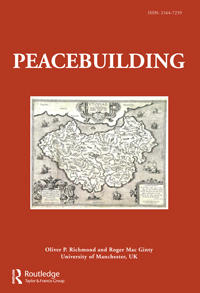"Post-liberal" peacebuilding and the crisis of international authority. In Peacebuilding
Peter Finkenbusch – 2016
This paper investigates how pragmatic approaches to peacebuilding might undermine the capacity of international policymakers to formulate a purposive, socially transformative project for their engagement with the Global South. Focusing on Oliver Richmond and Roger Mac Ginty’s recent work on ‘post-liberal’ peacebuilding, the analysis draws out how notions of ‘the everyday’, hybridity and ‘the local’ are geared towards disassembling the existing stock of reductionist liberal-universal knowledge claims. These were the ideological basis on which international interveners used to cohere their policy frameworks towards the Global South. Pragmatic approaches posit that the key to successful post-conflict transition lies in local – non-western, non-universalist – epistemologies and that empowering this pool of idiosyncratic insider understandings requires the deconstruction of modern liberal-universalist forms of knowing. While this dynamic of analytical and normative self-deconstruction is heralded as an opportunity for radical change ‘from below’, it simultaneously corrodes international authority as the ability to initiate and transform.

